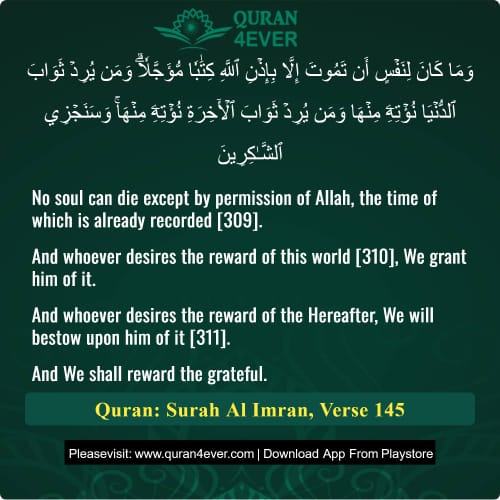
Transliteration:( Wa maa kaana linafsin an tamoota illaa bi iznillaahi kitaabam mu'ajjalaa; wa mai yurid sawaabad dunyaa nu'tihee minhaa wa mai yurid sawaabal Aakhirati nu'tihee minhaa; wa sanajzish shaakireen )
"No soul can die except by permission of Allah, the time of which is already recorded [309]. And whoever desires the reward of this world [310], We grant him of it. And whoever desires the reward of the Hereafter, We will bestow upon him of it [311]. And We shall reward the grateful."
From this verse, we learn that no one can escape death, and no soul will die without Allah's permission, as the exact time of death is already recorded. Therefore, deserting the battlefield in an attempt to save one’s life is a futile and blameworthy act, because death will find a person regardless of their actions. On the other hand, if one remains steadfast and resolute, they will not die before their appointed time, and will instead gain divine reward.
The phrase “reward of this world” refers to those who participate in battle solely for worldly gain, such as the desire for war booty. Such people will not be rewarded in the Hereafter, as they have already received their portion in this world. However, this does not guarantee that they will receive worldly comfort and peace, and hence no objection can be raised against the verse in this context.
The phrase “reward of the Hereafter” refers to those who strive in the path of Allah, including fighting in battle, with the intention of seeking Allah’s pleasure and eternal reward. These individuals will be rewarded in both worlds—this verse does not negate the possibility of receiving worldly blessings as well. Thus, those who seek the Hereafter sincerely will gain reward in this world and the next, by the grace and mercy of Allah.
The tafsir of Surah Imran verse 145 by Ibn Kathir is unavailable here.
Please refer to Surah Imran ayat 144 which provides the complete commentary from verse 144 through 148.
(3:145) It is not given to any soul to die except with the leave of Allah, and at an appointed time.[104] And he who desires his reward in this world, We shall grant him the reward of this world; and he who desires the reward of the Other World,[105] We shall grant him the reward of the Other World. And soon shall We reward the ones who are grateful.[106]
104. The purpose of this directive is to bring home to the Muslims that it would be futile for them to try to flee from death. No one can either die before or survive the moment determined for death by God. Hence one should not waste one’s time thinking how to escape death. Instead, one should take stock of one’s activities and see whether one’s efforts have either been directed merely to one’s well-being in this world or to well-being in the Hereafter.
105. The word thawab denotes recompense and reward. The ‘reward of this world’ signifies the totality of benefits and advantages which a man receives as a consequence of his actions and efforts within the confines of this world. The reward of the Other World’ denotes the benefits that a man will receive in the lasting World to Come as the fruits of his actions and efforts. From the Islamic point of view, the crucial question bearing upon human morals is whether a man keeps his attention focused on the worldly results of his endeavours or on the results which will acrue to him in the Next World.
106. The ‘ones who are grateful’ are those who fully appreciate God’s favour in making the true religion available to them, and thereby intimating to them knowledge of a realm that is infinitely vaster than this world. Such people appreciate that God has graciously informed them of the truth so that the consequences of human endeavour are not confined to the brief span of earthly life but cover a vast expanse, embracing both the present life and the much more important life of the Hereafter.
A grateful man is he who, having gained this breadth of outlook and having developed this long-range perception of the ultimate consequences of things, persists in acts of righteousness out of his faith in God and his confidence in God’s assurance that they will bear fruit in the Hereafter. He does so even though he may sometimes find that, far from bearing fruit, righteousness leads to privation and suffering in this world. The ungrateful ones are those who persist in a narrow preoccupation with earthly matters. They are those who disregard the evil consequences of unrighteousness in the Hereafter, seizing everything which appears to yield benefits and advantages in this world, and who are not prepared to devote their time and energy to those acts of goodness which promise to bear fruit in the Hereafter and which are either unlikely to yield earthly advantages or are fraught with risks. Such people are ungrateful and lack appreciation of the valuable knowledge vouchsafed to them by God.

For a faster and smoother experience,
install our mobile app now.
Related Ayat(Verses)/Topics